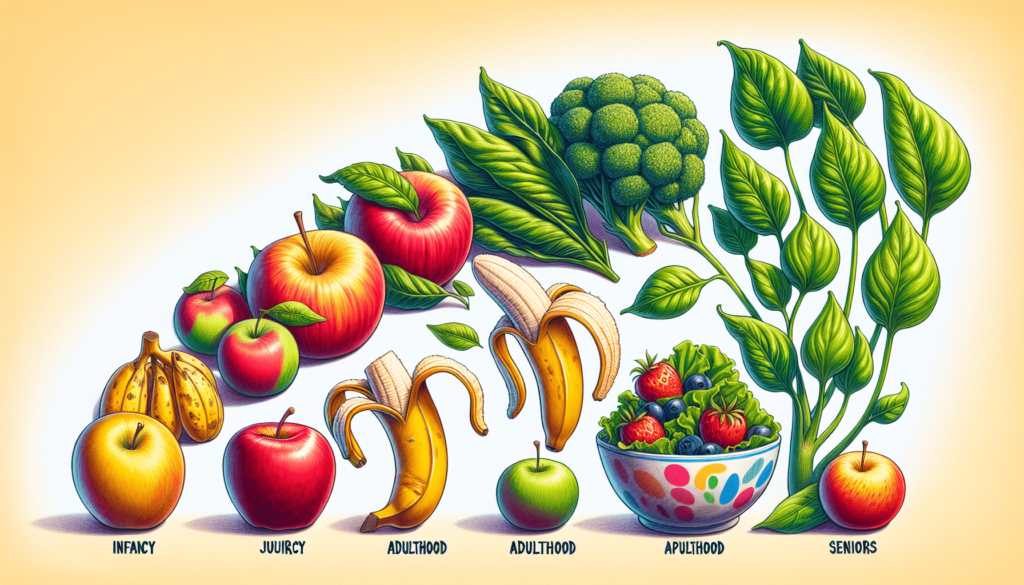Welcome to an informative article on the body’s nutritional needs throughout all stages of life, from infants to seniors. Understanding how to provide your body with the right nutrients is essential for overall health and well-being. Whether you are a parent wanting to ensure your child is getting the right nutrition or an older adult looking to maintain optimum health, this article will cover the basics of what your body needs at each stage of life. Stay tuned to learn more about how to best fuel your body for a healthy and happy life! Have you ever wondered how our nutritional needs change as we age? From infancy to old age, our bodies require different nutrients to support growth, development, and overall health. In this article, we will explore the nutritional needs of individuals at every stage of life, from infants to seniors.
Nutritional Needs in Infants
When it comes to infants, proper nutrition is crucial for growth and development. Breast milk or formula provides essential nutrients such as protein, fat, carbohydrates, vitamins, and minerals necessary for healthy development. As infants grow, their nutritional needs change, requiring a gradual introduction to solid foods rich in iron, calcium, and other vital nutrients.
Breast milk vs. Formula
Breast milk is considered the gold standard for infant nutrition, providing a perfect balance of nutrients that support optimal growth and development. It contains antibodies that boost the infant’s immune system and protect against infections. Formula, on the other hand, is a suitable alternative for mothers who are unable to breastfeed or choose not to. It is designed to mimic the nutritional composition of breast milk, providing infants with the necessary nutrients for healthy growth.
Introduction to Solid Foods
Around six months of age, infants are ready to start solid foods in addition to breast milk or formula. At this stage, it is essential to introduce a variety of foods to provide essential nutrients such as iron, calcium, and vitamins. Iron-rich foods like fortified cereals, meat, poultry, and fish are crucial for healthy brain development and growth. Fruits, vegetables, and dairy products are also essential for a balanced diet.
Nutritional Needs in Children and Adolescents
As children grow into adolescents, their nutritional needs continue to evolve. Proper nutrition is essential during these formative years to support growth, development, and overall health. A balanced diet that includes a variety of foods rich in protein, carbohydrates, fats, vitamins, and minerals is crucial for optimal growth and development.
Protein and Calcium
Protein is essential for growth, muscle development, and overall health in children and adolescents. Good sources of protein include lean meats, poultry, fish, eggs, dairy products, and plant-based sources such as beans, legumes, and nuts. Calcium is essential for bone growth and development during childhood and adolescence. Dairy products, leafy green vegetables, fortified cereals, and soy products are excellent sources of calcium.
Omega-3 Fatty Acids
Omega-3 fatty acids play a crucial role in brain development and cognitive function in children and adolescents. Fatty fish such as salmon, mackerel, and sardines are rich sources of omega-3 fatty acids. Plant-based sources like flaxseeds, chia seeds, and walnuts also provide this essential nutrient.

Nutritional Needs in Adults
As we transition into adulthood, our nutritional needs continue to change. A balanced diet that includes a variety of foods from all food groups is essential for maintaining overall health and well-being. Nutrient-dense foods rich in vitamins, minerals, protein, and healthy fats play a crucial role in supporting optimal health in adults.
Macronutrients and Micronutrients
Macronutrients such as carbohydrates, protein, and fats provide the body with energy and support various functions. Carbohydrates are the body’s primary source of energy and should come from whole grains, fruits, and vegetables. Protein is essential for muscle growth, repair, and maintenance and can be found in lean meats, poultry, fish, dairy products, beans, and legumes. Healthy fats like those found in nuts, seeds, avocados, and olive oil are crucial for brain health, hormone production, and overall health.
Fiber and Water
Fiber is essential for digestive health, weight management, and reducing the risk of chronic diseases such as heart disease and Type 2 diabetes. Fruits, vegetables, whole grains, legumes, and nuts are excellent sources of fiber. Adequate water intake is crucial for overall health, hydration, and maintaining proper bodily functions. Aim to drink at least eight glasses of water per day and more if you are physically active or live in a hot climate.
Nutritional Needs in Older Adults
As we age, our bodies undergo various changes that can affect our nutritional needs. Maintaining a balanced diet rich in essential nutrients is crucial for promoting healthy aging, preventing chronic diseases, and preserving cognitive function. Older adults may have specific nutrient requirements that need special attention to support optimal health and well-being.
Protein and Vitamin D
Protein is essential for maintaining muscle mass, strength, and overall health in older adults. Aim to include protein-rich foods like lean meats, poultry, fish, dairy products, beans, and legumes in your diet. Vitamin D is crucial for bone health, immunity, and muscle function, especially in older adults. Foods like fatty fish, fortified dairy products, eggs, and sunlight exposure are excellent sources of vitamin D.
B Vitamins and Antioxidants
B vitamins such as B12, B6, and folic acid are essential for energy production, nerve function, and cardiovascular health in older adults. Good sources of B vitamins include lean meats, fish, poultry, dairy products, leafy green vegetables, and fortified cereals. Antioxidants like vitamins C and E, selenium, and zinc help protect cells from damage, reduce inflammation, and support overall health. Fruits, vegetables, nuts, seeds, and whole grains are excellent sources of antioxidants.
Hydration and Fiber
Hydration is crucial for older adults to maintain proper bodily functions, cognitive function, and overall health. Dehydration can lead to dizziness, confusion, and other health issues, so it’s essential to drink an adequate amount of water throughout the day. Fiber is essential for digestive health, weight management, and reducing the risk of chronic diseases like constipation, diverticulitis, and heart disease. Include fiber-rich foods like fruits, vegetables, whole grains, legumes, and nuts in your diet to support optimal health and well-being.
In conclusion, understanding the body’s nutritional needs at every stage of life is essential for promoting optimal health, growth, and development. From infants to seniors, a balanced diet rich in essential nutrients is crucial for supporting overall health and well-being. By incorporating a variety of foods from all food groups and paying attention to specific nutrient requirements, you can support healthy aging and maintain optimal health throughout your life. Remember, it’s never too early or too late to prioritize your nutritional needs and make healthy choices for a better quality of life.


